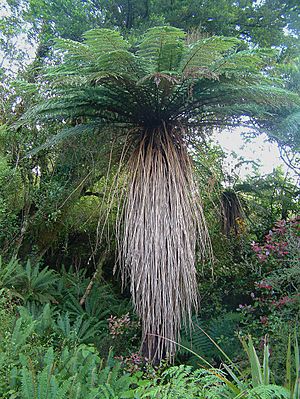Alsophila smithii facts for kids
Quick facts for kids Alsophila smithii |
|
|---|---|
 |
|
| Whole tree | |
| Scientific classification |
|
| Kingdom: | Plantae |
| Clade: | Tracheophytes |
| Class: | Polypodiopsida |
| Order: | Cyatheales |
| Family: | Cyatheaceae |
| Genus: | Alsophila |
| Species: |
A. smithii
|
| Binomial name | |
| Alsophila smithii (Hook.f.) R.M.Tryon
|
|
| Script error: The function "autoWithCaption" does not exist. | |
| Synonyms | |
|
|
Script error: No such module "Check for conflicting parameters".
The soft tree fern, also known as kātote, is a special type of tree fern. Its scientific name is Alsophila smithii, but it's also known as Cyathea smithii. This beautiful plant comes from New Zealand.
Contents
Where it Lives
The soft tree fern grows naturally all over New Zealand. You can find it on the North and South Islands. It also lives on Stewart Island/Rakiura and the Chatham Islands. You can even find it as far south as the Auckland Islands.
It often grows in forests high up in the mountains. In the southern parts of New Zealand, it can also be found in forests closer to sea level. In the Westland forests of the South Island, you'll see it growing under bigger trees.
What it Looks Like
The kātote is a tree fern that grows up to 8 meters (about 26 feet) tall. It usually stays shorter than other large tree ferns. It grows slowly and isn't the strongest competitor, except in higher, colder places.
Like other tree ferns, it has rough scales on its stems and trunk. A cool thing about this fern is that it keeps its dead fronds (leaves) around its trunk. These dead fronds form a "skirt." This skirt is made only of the central stem of the frond, so it looks neater than the skirt of some other ferns.
The Alsophila smithii produces many soft and delicate fronds. These fronds spread out from the top of the fern. They can grow to be about 2 to 2.5 meters (6.5 to 8 feet) long.
Growing Soft Tree Ferns
The soft tree fern doesn't like strong wind, too much sun, or frost. It can also dry out easily. However, you can grow it successfully in places that are protected from these harsh conditions.
How People Use It
In the past, people sometimes used the soft inner part of the fern's trunk. This part, called the pith, was a source of starch. However, it has a lot of resin, which might make it taste a bit strange. So, it was probably used only when other foods were hard to find.
The trunks of tree ferns have also been used for building. They were made into rough fences and temporary paths.
Images for kids
 | DeHart Hubbard |
 | Wilma Rudolph |
 | Jesse Owens |
 | Jackie Joyner-Kersee |
 | Major Taylor |




